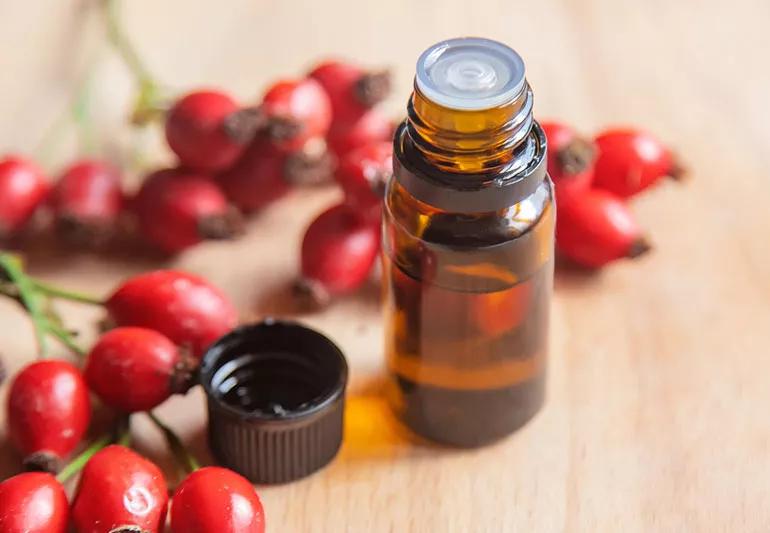Get your rosy glow on from head to toe

With skin care products, it seems like there’s a new Holy Grail ingredient every other minute. And with all of the promises of tightening, brightening, plumping or de-bumping, it’s hard to keep up.
Advertisement
Cleveland Clinic is a non-profit academic medical center. Advertising on our site helps support our mission. We do not endorse non-Cleveland Clinic products or services. Policy
On the other hand, if you live for the latest products, you’ve most likely heard about rose hip oil or rose hip seed oil.
So, what’s the deal with rose hip oil and should you add it to your skin care regimen? Dermatologist Shilpi Khetarpal, MD, gives us the scoop on how to use this rose-gold goodness.
Rose hips are the fruit of roses and can be found under the flower’s petals. Filled with nutrient-rich seeds, this fruit is often used in teas, jellies, sauces, syrups and much more. Rose hips from wild roses and a species known as dog roses (Rosa canina) are often pressed to produce rose hip oil. The vivid orange bulbs give way to oil of a similar color.
“They are the same thing and are harvested from the seeds of rose bushes. They are known for being rich in vitamins, antioxidants and essential fatty acids like omega-3 (linolenic acid) and omega-6 (linoleic acid),” explains Dr. Khetarpal.
Dr. Khetarpal says that if used correctly, rose hip oil can be combined with your skin regimen to enhance results. It can be used one or two times daily. Some of the reported rose hip oil benefits for your skin include:
“Rose hip oil is rich in vitamins A, C, E and essential fatty acids. These fatty acids are anti-inflammatory and can improve signs of aging, pigmentation and moisturize the skin,” she says.
Advertisement
She adds that as rose hip oil is rich in vitamin A, it can help stimulate collagen and improve the appearance of fine lines and wrinkles. It can also calm inflammation due to vitamin E and anthocyanin, the pigment that gives darker-colored fruits and vegetables their hues.
Is rose hip oil good for acne? According to Dr. Khetarpal, as it’s nutrient-rich, rose hip oil can help improve inflammatory acne and clear up acne scars. It can be used on your face and body, and you can find rose hip oil formulas that are noncomedogenic (won’t clog your pores).
Since rose hip oil is loaded with fatty acids, it can help keep your skin hydrated. While you might think that this oil is extremely heavy, it’s fairly lightweight and easily absorbed by skin. Some people even use it to moisturize or deep condition their hair.
Before you slather it all over, Dr. Khetarpal recommends doing a skin patch test first to make sure it won’t irritate you.
“As with any topical product, there is a small chance of allergy. It is best to try a small amount on an area like the forearm prior to applying it to the entire face or body,” she suggests.
If you have oily skin, you might want to pass on this one. Rose hip oil has vitamin C in it and that can promote excess hydration. If you’re considering rose hip oil for the hair, you’ll want to avoid it if your hair is very fine because the oil could weigh it down.
Dr. Khetarpal says that rose hip oil can be applied directly to your skin when used in its pure form or used as a carrier oil for other facial oils. When you’re shopping for one, make sure the rose hip oil is packaged in a dark, amber-colored bottle. This protects it from UV rays, which can make it less effective.
If you buy unrefined or raw rose hip oil, be careful when applying it. These versions are less processed. So, while they’re rich in nutrients, they’re also rich in color. And that color can be quite noticeable on your hands, body — and clothes. If you don’t want that rosy-gold hue all over you, try an organic, cold-pressed option.
Advertisement
Learn more about our editorial process.
Advertisement

It’s a great disinfectant for around your home, but not for your skin

Changes in texture, smell, color and performance are signs it’s time to throw the cosmetic item away

Strengthening your skin barrier, simple routines and minimizing products are ongoing, popular trends

Moisturizing, running a humidifier and adjusting your showers may help keep itchiness and irritation at bay

Glycolic acid benefits skin tone, texture and pigmentation by exfoliating dead skin

Some gentle soap and warm water go a long way when you’re washing these cosmetic tools regularly

New formulas are less drying and contain water-based and skin-loving ingredients

At a minimum, in the morning, apply a cleanser, followed by a moisturizer and sunscreen, in that order

Wearing a scarf, adjusting your outdoor activities and following your asthma treatment plan can help limit breathing problems

Your diet in the weeks, days and hours ahead of your race can power you to the finish line

When someone guilt trips you, they’re using emotionally manipulative behavior to try to get you to act a certain way